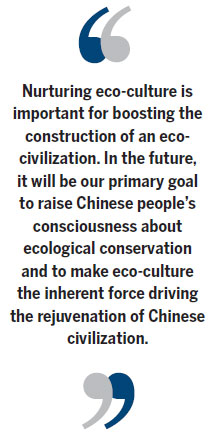Time is ripe to build a global eco-culture
Updated: 2015-06-05 06:01
By Jiang Zehui(China Daily Europe)
|
|||||||||||
People are awakening to ecological awareness, but there are many tasks ahead
The Post-2015 Development Agenda released by the United Nations in December 2014 and the UN Millennium Development Goals, both of which have put a greater focus on sustainability, are evidence of a reflection on the industrial civilization and the awakening of people's ecological awareness globally.
Around the world, the popular choice is to start an age of eco-civilization, which is represented by harmony between people and nature, people and society, as well as among individual human beings. Ecological justice, green growth and caring about people are the core values of eco-civilization, with eco-culture as its soul.
Eco-culture is indeed closely integrated with our lives. All our decisions are made according to our values when human beings interact with nature. Eco-culture profoundly explains how mankind is closely related to natural ecosystems. It broadens people's visions about ecological environments and guides people toward harmonious and shared prosperity by following nature's principles.
China Eco-Culture Association has been endeavoring to nurture the concept nationwide since its establishment in 2008. As of 2014, it has held six eco-culture forums, picked 321 national eco-culture model villages, nine national eco-culture demonstrative bases, and 20 national eco-culture model enterprises. To gradually form an interactive eco-culture education mechanism that integrates schools, families and society, the association has organized many activities in primary schools.

The association has carried out theoretical research about eco-culture and has published a series of books about the environment, including Mainstream Culture of Ecological Civilization Era: An Overview of China's Eco-Culture System Study in 2012, the English edition of the Charm of Bamboo - 100 Selected Ancient Chinese Poems on Bamboo and a periodical, Ecological Civilization of the World. The association held the Silk Road Eco-culture Tour in 2011 and 2012. The tour, which followed the ancient Silk Road, established a number of eco-cultural landmarks, including the Chang'an Tower at the site of the 2011 International Horticultural Exposition held in Xi'an, the Seven Star Crag in the Khobqi Desert in Inner Mongolia, Crescent Lake in Dunhuang of Gansu province and the China garden at the Floriade exhibition in the Netherlands in 2012. The association organized a photography exhibition called Beautiful Chinese Villages at Kazakhstan's national museum in its capital Astana during a local "Chinese Culture Day" in September 2014. The exhibition will also be shown at the China Pavilion during the Milan Expo in June.
Nurturing eco-culture is important for boosting the construction of an eco-civilization. In the future, it will be our primary goal to raise Chinese people's consciousness about ecological conservation and to make eco-culture the inherent force driving the rejuvenation of Chinese civilization.
Measurements that can quantify advances in eco-civilizations, such as an index, a natural resources calculation system, an evaluation system of green GDP as well as an ecological performance evaluation system should be established as soon as possible.
We should strengthen the protection of ecological and cultural resources and build charming cities and towns of clear regional characteristics. More urban forestation is also needed so that city residents can be close to nature.
We will carry on with our campaign of selecting national eco-cultural villages. Eco-cultural villages that have rich histories and cultures, as well as strong indigenous and ethnic features, should be protected.
We should make sure that ecological protection and people's interests are united and guaranteed with an effective system. We should build a modern media communication system that includes newspapers, books, and digital new media to promote eco-culture. Eco-culture should be popularized in schools, with more ecological museums and other educational organizations that can promote the concept.
We will enhance ecological awareness in the public through "green festivals", such as Tree Planting Day, World Wetlands Day, International Biodiversity Day as well as World Desertification and Drought Control Day. We will further carry out activities aimed at promoting the protection of forests and rivers.
We will build multiple open forms of exchange platforms to boost communication and learning about ecological construction between regions, governments and international organizations.
The rich tradition of eco-culture, which has been passed down by our ancestors during China's long history, is testimony to their wisdom and remains the spiritual focus of all Chinese people. It's also the treasure of mankind. Eco-culture can enhance people's cultural self-confidence and self-awareness. It improves the relationship between humans and nature, and ensures the sustainable development of our economy and society. Eco-culture will go mainstream in the age of eco-civilization. But the road to cultivate eco-culture and make it the backbone of our eco-civilization is long.
The author is president of China Eco-Culture Association. The views do not necessarily reflect that of China Daily.
(China Daily European Weekly 06/05/2015 page12)
Today's Top News
65 bodies found, more than 370 still missing
Ex-FIFA executive detailed bribes in 2013 secret guilty plea
Beijing 'shocked' at Nazi comparison by Philippines
Ship disaster in Yangtze River: Roundup of updates
HK economy will suffer if reform fails, tycoon says
Blatter rocks world soccer by quitting FIFA amid scandal
Obama signs bill remaking NSA phone records program
China's Dalian Wanda buys Australian cinema chain Hoyts
Hot Topics
Lunar probe , China growth forecasts, Emission rules get tougher, China seen through 'colored lens', International board,
Editor's Picks

|

|

|

|

|

|






